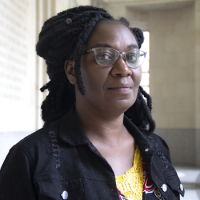Food Security Systems as Drivers for Sustainable Peacebuilding in Africa: The Case of Kenya
Submit a question
Ms. Cheri Ayers, Program Assistant (Communications), welcomed participants and introduced the event, the SVNP project, and the scholarship program. Mr. Michael Bittrick, Senior Advisor for the Office of Global Food Security at the U.S. Department of State, framed the discussion, introduced the speakers, and moderated the event. The event featured Dr. Florence Odiwuor, a Southern Voices Network for Peacebuilding Scholar at the Wilson Center and Lecturer at the School of Agriculture, Natural Resources and Environmental Studies at Rongo University in Kenya, and Dr. Danielle Resnick, David M. Rubenstein Fellow for the Global Economy and Development Program at the Brookings Institution and Non-resident Fellow at the International Food Policy Research Institute (IFPRI).
This event discussed the current state of food security in East Africa in general and Kenya in particular, examined the causes and impacts of food insecurity and the linkages to peace and security in Kenya, and assessed approaches to enhancing food security to determine what is working and what could be improved. Speakers offered practical options and lessons learned for how policymakers and practitioners can more effectively tackle the challenges of building resilient food systems for sustainable peace.
Mr. Bittrick opened with an acknowledgement of food insecurity as a driver of instability and how the African Union (AU) has prioritized this issue when they declared 2022 the “Year of Nutrition: Strengthening Resilience in Nutrition and Food Security on the African Continent.” He underscored the Malabo Declaration as a key policy to ensure African ownership and leadership across food systems and within agriculture. He emphasized the impact of other stressors on regional and global food systems, including the Russia war in Ukraine, climate change, the COVID-19 pandemic, pests, and more. He also remarked that addressing food insecurity for the short, medium, and long-term is, and will be, a multi-sectoral and multi-ministerial effort.
Dr. Resnick framed the discussion in Kenya’s current geopolitical context. Agriculture is critical to Kenya’s economy and accounts for about 65 percent of exports, 25 percent of GDP, and is a livelihood source for about 60 percent of Kenyans. As a picture of mixed progress, Kenya has seen notable achievements with regards to reducing under-5 stunting and improved agricultural sector growth contributing to poverty reduction in the last decade; however, the number of undernourished is 14 million and Kenya is off-track on 18 of 24 Malabo Commitment indicators. Threats to food systems, including pests, drought, and the Russia-Ukraine conflict, are reducing food systems production and increasing costs for production. IFPRI estimated the Russia-Ukraine crisis will increase the poverty rate by 2.6 percent, or roughly 1.4 million people. Attendant issues related to food safety and the Kenyan government has demonstrated political will and a prioritization of food security as demonstrated by its Agriculture Sector Transformation and Growth Plan and President Kenyatta’s “Big Four” Agenda, which includes food security as a priority. However, other policy actions, including acts aimed at improving the livestock sector are bogged down in the legislative process. Furthermore, a mixed subnational taxation landscape has complicated and increased the costs for inter-country trade. The confluence of shocks, exacerbated by inflows of small arms, has made conflict more pronounced in some areas and rising food pricing could lead to social unrest. Dr. Resnick concluded with policy options, including: increasing commitment to investments in research and development and extension services as well as considering public budget tracking to create citizen demand and accountability within counties for these efforts; improving land security by, for example, better mapping of public, private, communal lands and building abattoirs closer to livestock communities; and consolidating subnational agriculture taxation through, for example, Kenya’s council of governors.
Dr. Odiwuor addressed the food system-peace nexus and the impact on peace and security of disruptions or failures to food systems. Kenya is at acute risk for food insecurity and climate change and persistent drought has increased the amount of arid and semi-arid land in Kenya, thereby affecting livestock migration patterns that contributed to some communal conflicts. Reduced agricultural outputs and spikes in pricing impacted citizens, some of whom have expressed frustration with the government on social media, which Dr. Odiwuor noted as an indicator of increased risk for riots. Youth are insufficiently employed, including in Kenya’s food system, which can contribute conflict if youth become involved in criminal activities as a mean of livelihood. Dr. Odiwuor noted that the AU is concentrating efforts to building resilience in food systems through the Malabo Declaration and the Comprehensive African Agriculture Development Framework (CAADP), and that the Kenyan Government has its own policy commitments, frameworks, and goals—such as naming food security as a right in Kenya’s constitution and Kenya Vision 2030, the Agriculture Sector Transformation and Growth Plan, and Kenya Nutrition and Food Security policies. Development partners are also engaged in building community resilience. While much progress has been achieved, much more remains and implementation has been slow. She underscored that Kenya’s 10 percent budgetary commitment to agriculture stands at just 3.2 percent. She noted additional economic challenges including global inflation and competition from other countries. Dr. Odiwuor addressed challenges specific to smallholder farmers in Kenya, including under production and under investment. Women are majority of Kenya’s smallholder farmers and produce up to 80 percent of food supply in country. In addition to other constraints on smallholder farmers, women have lower education levels, lack of collateral and credit, lack of access to adequate inputs, and additional domestic duties, which reduce the output capacity. She offered policy options, including establishing food and agricultural peace hubs to service delivery systems to smallholder farmers, increase outputs, and increase resiliency; increase government budgetary allocation to enhance agricultural development activities; and increase agricultural education and training for citizens to open up career pathways for Kenya’s youth.
Southern Voices Network for Peacebuilding: Centering African knowledge and agency is key to building and sustaining peace in Africa. The Southern Voices Network for Peacebuilding (SVNP) is a network of 22 African policy, research, and academic organizations that works with the Wilson Center’s Africa Program to attain the most appropriate, cohesive, and inclusive policy frameworks and approaches for achieving sustainable peace in Africa. Generously funded by Carnegie Corporation of New York since its establishment in 2011, the SVNP works to generate African knowledge to inform U.S. and international peacebuilding policies on Africa; help build the next generation of African peacebuilders through its scholarship program; and create a pan-African network of African peacebuilding organizations, practitioners, and experts to collaborate and share knowledge, best practices, and lessons learned on peacebuilding in Africa.
This event was livetweeted and webcast. Follow the Africa Program Twitter account @AfricaUpClose and catch up on the conversation using the hashtags #FoodSystems and #SVNP.
Speakers

Lecturer, School of Agriculture, Natural Resources and Environmental Studies, Rongo University, Kenya
Introduction

Moderator

Hosted By

Africa Program
The Africa Program works to address the most critical issues facing Africa and US-Africa relations, build mutually beneficial US-Africa relations, and enhance knowledge and understanding about Africa in the United States. The Program achieves its mission through in-depth research and analyses, public discussion, working groups, and briefings that bring together policymakers, practitioners, and subject matter experts to analyze and offer practical options for tackling key challenges in Africa and in US-Africa relations. Read more
